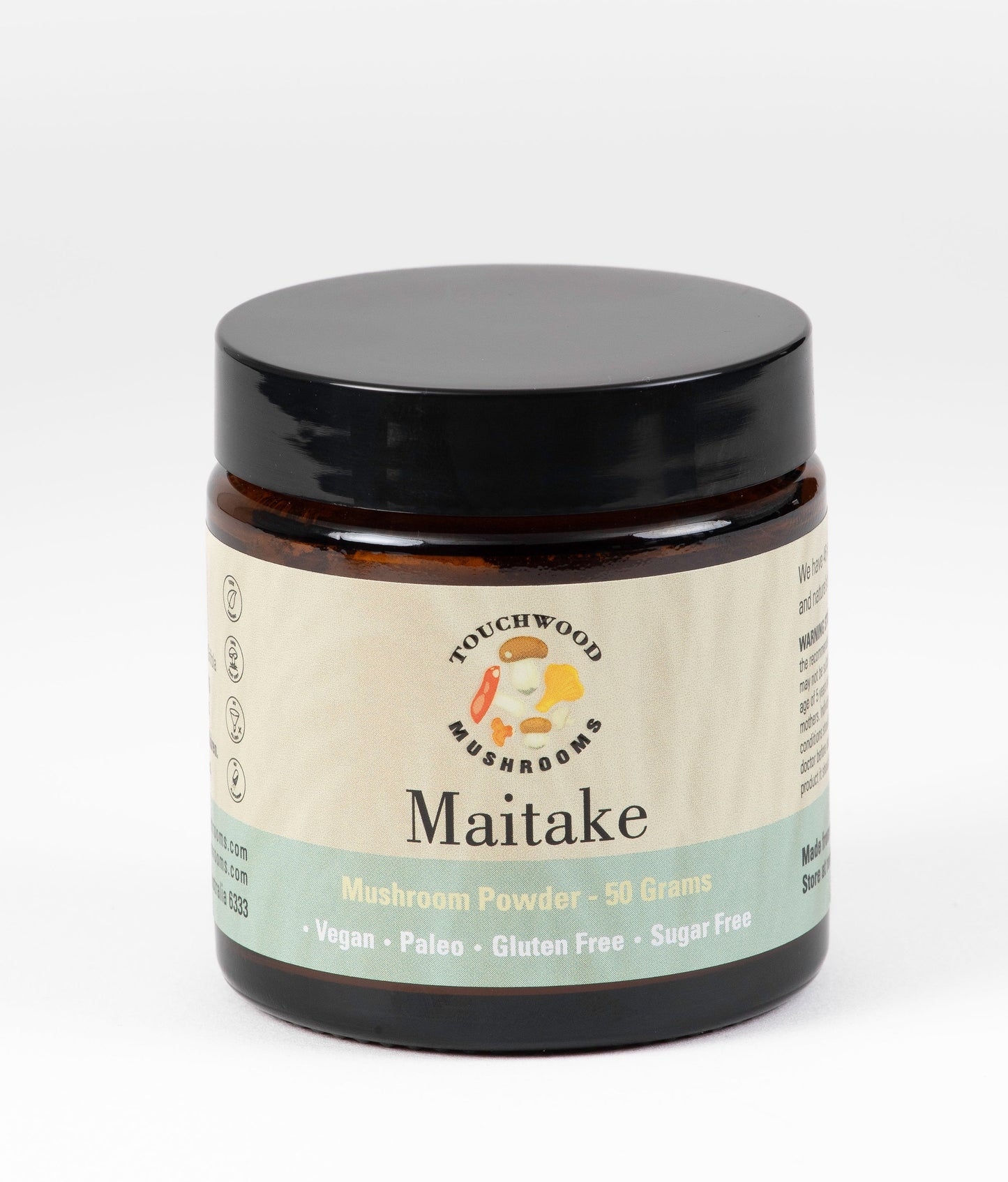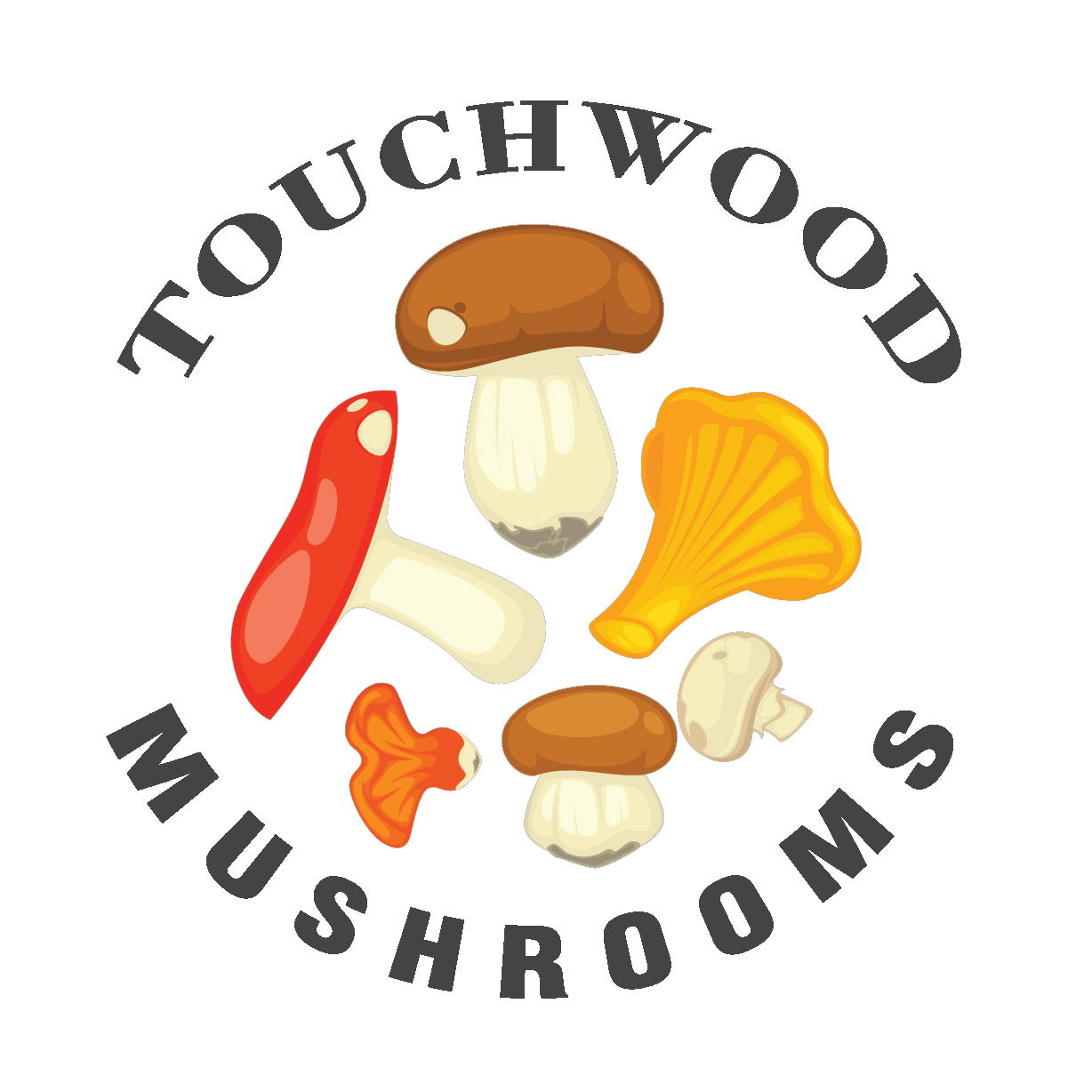
We’re seeing more people become interested in the benefits of Maitake mushroom powder in Australia. Known scientifically as Grifola frondosa but colloquially as ‘Hen of the Woods’, Maitake has earned a reputation among those seeking to improve their wellbeing and general health. These mushrooms contain high levels of beta‑glucans and unique proteoglucan fractions that have been studied for their specific benefits. These potential benefits include:
- Immune system support
- Blood sugar regulation
- Enhanced gut health
- Adaptogenic properties
At Touchwood Mushrooms, we’ve been developing and refining functional mushroom extracts for over 50 years – from growing whole mushrooms, through to extracting the beneficial compounds, and digging into the science behind these fungi.
In this guide, we’ll walk you through what the research suggests are the benefits of Maitake mushrooms and how to incorporate Maitake mushroom extract into your daily routine. We’re also sharing what to look for when choosing a Maitake supplement so you get the most out of it for your everyday health.
What is Maitake?
Maitake (Grifola frondosa) is a large, frond‑like mushroom that grows in clusters at the base of hardwoods. It grows in the wild in East Asia, North America and Europe; it’s commercially cultivated all over the world.
Traditional uses of Maitake

Maitake has been used for centuries in Japan and China, where it was made into an every tonic, simmered as a tea or added to broths. These slow water-based extraction methods took advantage of the solubility of Maitake’s polysaccharides – modern extraction methods have further refined this process to draw down even more of the beneficial compounds.
In Traditional Chinese medicine, Maitake was used to support the spleen and enhance qi, the vital energy or life force that flows through the body. While tradition doesn’t prove outcomes, it helps explain why Maitake remains a daily staple for many people seeking gentle daily support for their health.
What makes Maitake remarkable?
Maitake is abundant in beta-glucans, which are bioactive extracts and have been the focus of much of the scientific research.
D‑fraction and MD‑fraction
These beta glucans have been extensively studied for their effects on heart health and cholesterol levels, as well as immune modulating profile and the ability to help to stabilise blood sugar levels.
Some oncology-related research has also explored whether these compounds can inhibit cancer cell growth, and even improve the quality of life of cancer patients.[1] While this research is promising, it’s still early and can’t be taken as definitive.
SX‑fraction
SX-fraction is a bioactive glycoprotein associated with hypoglycemic activity. Early studies have explored potential effects on insulin sensitivity and glucose metabolism, and suggest that SX-fraction could be used in the treatment of type 2 diabetic patients. The evidence is still preliminary and should be considered alongside diet, movement, sleep and guidance from a health professional.[2]
What are the benefits of Maitake?
Maitake supports immune health
Laboratory and animal studies consistently show Maitake compounds can influence immune markers. Small human studies have reported shifts in immune parameters when Maitake fractions are used alongside standard care in specific contexts. These studies inform mechanisms and safety but do not establish Maitake as a treatment.[3]
Practical takeaway: Think “balanced immune support” and “whole‑of‑lifestyle complement,” not a quick fix.
Positive impact on metabolic markers
Metabolic markers – including blood pressure, blood sugar, triglycerides, cholesterol and waist measurement – are used to gauge overall health.Preliminary human and animal research on Maitake, particularly SX‑fraction, has explored outcomes related to insulin sensitivity, fasting glucose and lipids.[4]
Findings are mixed and often small in scale. If metabolic health is your focus, consider Maitake as a supportive addition to fundamentals like nutrition quality, fibre intake, movement and sleep.
Maitake may enhance gut health
As a source of complex polysaccharides, Maitake fits into the broader conversation about how dietary fibres can influence gut microbiota and downstream immune signalling.
The Maitake mushroom has been shown to reduce markers of inflammation and compounds that trigger inflammatory bowel disease. Colon inflammation is associated with IBD, and a study in 2009 confirmed the mushroom’s potential as an IBD treatment. The researchers found that a maitake water extract can suppress TNF-alpha, an inflammatory response promoter involved in IBD.[5]
How to choose a quality Maitake supplement
Not all Maitake supplements are created equal. Here’s what we focus on in creating our functional mushroom extracts.
Fruiting body vs mycelium
We use 100% fruiting body. It’s naturally dense in beta‑1,3/1,6‑glucans and is the part historically used in long, water‑based extractions.
The alternative is extracts made using mycelium. This refers to the ‘root’ part of the mushroom, grown on grain- or rice- based substrate. Because it’s near impossible to separate the mycelium from the substrate, extracts made from mycelium can contain a high proportion of grain starch, which dilutes the compounds and introduces unnecessary fillers into the final product.
There is little evidence that commercially-made mycelium extracts offer the full suite of health benefits, compared to products made from the fruiting body only.
For consistent results, we recommend only choosing certified‑organic 100% fruiting body Maitake extracts with transparent sourcing.
Maitake mushroom powder extract
Versatile and easy to add to your day. Our Organic Maitake Mushroom Powder is dual‑extracted and then dried, so you’re getting a concentrated, ready‑to‑use powder made from fruiting bodies only. Suggested serving is ½ a level teaspoon. It’s versatile and easy to incorporate into food and drinks, such as tea, soup or stews.
Explore Organic Maitake Mushroom Powder
Maitake mushroom for dogs
- Interest in mushrooms for pets is growing. Compared with Turkey Tail, there are fewer canine studies on Maitake specifically. If you’re considering Maitake for your dog:
Speak with your veterinarian first, especially if your pet has a diagnosed condition or takes medication. - Ask about species‑appropriate dosing and whether a powder or an alcohol‑free preparation is most suitable.
- Keep expectations realistic; evidence in animals is still emerging and products vary widely.
What to expect
As with any functional mushroom product, consistency is key. Many people report noticing changes to their general wellbeing, including energy levels, within 4-8 weeks of daily use. Everyone is different and Maitake isn’t designed as a quick fix.
A lot of our customers choose to have their Maitake mushroom supplement delivered on subscription so it shows up before they run out. Not only does that help with that consistent use, but it also helps to save money.
Tip: To make Maitake part of your daily habit, pair it with another activity – such as your morning coffee – so it’s easy to remember.
The bottom line
Maitake is a classic functional mushroom with a modern evidence base, especially around immune modulation and early work on metabolic health. If you’re looking for a simple, routine‑friendly way to try it, organic Maitake mushroom powder is easy to add to hot or cold drinks and savoury dishes.
Ready to explore? Discover our Organic Maitake Mushroom Powder
